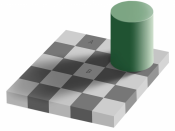How can visual illusions help us to understand lower and higher level process in visual perception?
A visual illusion may refers to the case where what we perceive differs from what we suppose to be correct. As Nicholas et al. (2001) note that the idea of a visual illusion presupposes that the object or pattern concerned would be different under other conditions. One view of illusions is that they can be used as tools to probe the mechanisms of visual perception, because perceptual errors give us clues about the way in which normal perception takes place .
Gregory (1997) explains that the act of perceiving is a dynamic process. He goes on arguing that that perception is the brain's search for the best interpretation of the data that is being presented. Sometimes the perceptual hypothesis is incorrect and an illusion occurs.
Most of the theories for visual illusion are categorized in two groups.
The first group attributes illusions to innate and fixed physiological neural cell activities . These activities involve lower level and more independent functions of human. These functions are collectively referred to as early vision or low level vision. Theories on the second group are concerned with higher levels such as the feelings, will or intelligent judgment of humans.
The high and low levels of processing can be explained as top-down and bottom-up process respectively. When a stimuli is presented to the participant, it causes certain internal cognitive process to occur. This process finally produces the required response or answer. As explained buy M. Eysenk (2001), processing directly affected by the stimulus input is usually described as bottom-up processing. On the other hand, top-down processing is the one that is influenced by the individual's expectations and knowledge rather than the stimulus itself.
Contructivist theorists emphasize the role of...


